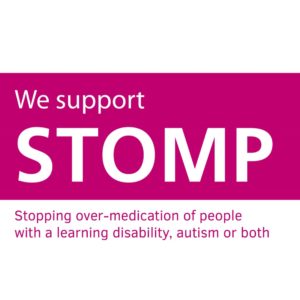
Northumberland, Tyne and Wear NHS Foundation Trust has reaffirmed its commitment to a national programme to address the over-medication of people with learning disabilities and/or autism at a meeting with two national NHS bodies.
A team of NTW staff welcomed guests from NHS England (NHSE) and NHS Improvement (NHSI) to its Mitford Northgate site on 12 December 2018 to discuss the Trust’s comprehensive and wide-ranging work for STOMP, a national project to stop the over-medication of people with a learning disability, autism or both with psychotropic medicines.
It’s fantastic that NTW has committed to fully supporting the national STOMP principles, and I am proud to be part of a Trust-wide team working in partnership with service users, their families and carers to stop the over-use of psychotropic medication.
We know that over-medicating individuals with learning disabilities, autism or both can be unnecessary, counter-productive and even detrimental to an individual’s well-being. We must continue to work hard to ensure that anyone with a learning disability and/or autism is receiving the right medication, at the right time, for the right reason.
Caroline WillsNTW Clinical Development Lead for learning disabilities
NTW signed up earlier this year to the STOMP pledge, which includes commitments to actively explore alternatives to medication, and to work in partnership with people who have a learning disability and/or autism and their carers to involve service users in decisions about the use of psychotropic medicines.
The Trust has also committed to ensure that all its frontline staff have both an understanding of psychotropic medication including the reasons for prescribing and likely side-effects, and that all staff can speak up if they have concerns that someone is receiving inappropriate medication.
If medication is needed it should be initiated in addition to alternative interventions and be clearly targeted to behaviour, monitored regularly as stated in NICE guidance and reviewed regularly. It should always be at the lowest dose for the shortest time.
If someone is admitted to one of NTW’s inpatient services, staff will comprehensively assess their current medication before providing advice based on STOMP principles.
This includes consulting with a service user and their family to produce a complete medication timeline examining what mood-changing medicines an individual may be taken or have taken in the past, to investigate the possibility of changing or reducing their use.
For individuals who are treated within their community, NTW’s work within STOMP includes awareness-raising with families and care networks, training sessions for carer forums, and community outreach around stopping the over-use of medication.
NTW has set up a number of dedicated STOMP clinics where individuals with a learning disability, autism or both can be referred by a GP or other healthcare professional for their medication to be reviewed in detail.
The STOMP clinic at NTW’s Monkwearmouth site has been recognised as a national centre of excellence, and has been visited by several other NHS Trusts who are looking to develop similar processes.
STOMP is a national project managed by NHS England which aims to help people to stay well and have a good quality of life through reducing the over-use of psychotropic medicines – drugs which affect how the brain works.
Psychotropic medicines include treatments for psychosis, depression, anxiety, sleep problems and epilepsy, and they are sometimes also given to individuals because their behaviour is seen as challenging.
People with a learning disability, autism or both are more likely than other people to be given these medicines, which can cause problems if people take them too much, for too long or for the wrong reason.
Public Health England estimates that every day over 30,000 adults with a learning disability take psychotropic medicines when they do not have the health conditions the medicines are for.
The mother of a service user has written about her experience of NTW’s STOMP clinic at the Newcastle Community Team Learning Disability (CTLD) team. Read D’s Story here.
Find out more about STOMP on NHS England’s website.
You can also follow the Twitter hashtag #WeSupportSTOMP for updates on the STOMP programme.
